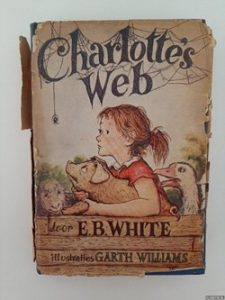The John Newbery Medal was named for the eighteenth-century British bookseller John Newbery. He was born in 1713, was apprenticed to a printer, and eventually set up his own successful publishing company and book shop.
The interesting thing about John Newbery is that about a third of the books he published were children’s books, this at a time when children’s literature wasn’t really a thing. He was very keen for children to have an education, to learn and to read. He wanted them to know and understand how reading can be fun and also educational. I think many of us today would want that too, wouldn’t we?

In the early 1920s the American Library Association decided to present an annual award to the author of the most distinguished children’s literature in USA. The first award was given in 1922. It isn’t presented every year; there have been a few years when there has not been a book considered worthy of the prestigious award.
One of the things I like about looking at award winning books like the Newbery Medal winners or Newbery Honor winners is that you get a good long list of books that are worth considering for reading to children or recommending to children to read.
And looking at the Newbery list I can see that some of these books have really stood the test of time, and are still in print and being enjoyed by children and adults alike today. For example, in 1923 Hugh Lofting won the Medal for The Voyages of Doctor Dolittle. And E.B White won a Newbery Honor for Charlotte’s Web as long ago as 1953.

Laura Ingalls Wilder had five of her books named a Newbery Honor between 1938 and 1944.

A few of my old favourites would also be The Trumpeter of Krakowby Eric P. Kelly (1929); King of the Wind by Marguerite Henry (1949); From the Mixed-Up Files of Mrs. Basil E. Frankweiler by E.L. Konigsburg (1968); Roll of Thunder, Hear My Cry by Mildred D. Taylor (1977) and Number the Stars by Lois Lowry
(1990).

I have noticed that the more recent medal winning novels are more likely to be gloomy with non-traditional family relationships. They are experimental in style and content, and I don’t always fully understand why they are considered to be the most distinguished children’s literature in USA. For example, the 2022 winner is a dystopian sci-fi novel for young adults. The 2017 winner is a fantasy that some adults have enjoyed but it’s probably unsuitable for pre-adolescent children and has been described as ‘nonsensical, over-written and predictable’. And the 2010 winner is a sci-fi mystery novel in blank verse which has been described as ‘uncouth’, ‘sad and depressing’, and ‘boring’. Can you imagine anyone describing Charlotte’s Web like that? Me neither.
If you like a more modern style then try some of the newer medal winners although I would recommend that you read them through before giving them to children to read. And if you prefer a more traditional style and less worrying content then I recommend some of the older books, and I don’t think you’ll be disappointed with them. The older books are not weak, or insensitive to modern issues, but they present the issues in a gentle way and offer solutions to problems, too.
I have one more children’s book award to talk about in this series, so look out for it. In the meantime, write to me and tell me what you’re reading, or what you recommend to me to read. I look forward to hearing from you.
